monish
AH elite
Peter Hathaway Capstick, Hunter (1940-1996)

Peter Hathaway Capstick (1940-1996)
Peter Hathaway Capstick was a famous American hunter and author. Born in New Jersey and educated at the University of Virginia, he walked away from a successful Wall Street career shortly before his thirtieth birthday to become a professional hunter first in Central and South America and later--and most famously--in Africa. Capstick spent much of his life in Africa, a land he called his "source of inspiration."Though he spent decades hunting some of the world's most dangerous game, his death did not come from a lion's jaws or an elephant's tusks. A chain-smoker and heavy drinker, he died at the relatively young age of 56 from complications following heart surgery.
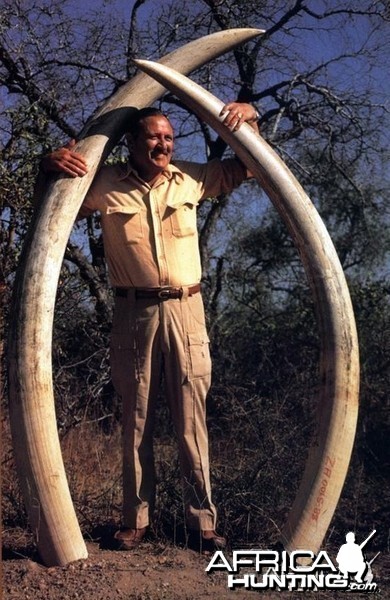
Peter H. Capstick with the tusks of the famous elephant, Phelwana, which had to be destroyed in Kruger National Park after being injured through unknown causes. The tusks weigh 158 and 141 pounds respectively, making him the largest tusker ever recorded in the region.
After a short career as a Wall Street stockbroker, Capstick headed to Latin America. There he traveled widely while hunting, fishing, and mastering the Spanish language. After a few years he returned to New York, where he founded a business arranging professionally guided hunting trips. Shortly thereafter he took a position as hunting and fishing director of Winchester Adventures of New York, a subsidiary of the famous gun manufacturer. In that capacity he made his first trip to Africa in 1968 . Subsequently he began working as a professional hunter and game ranger in Zambia, Botswana, and Rhodesia.

Peter Hathaway Capstick (1940-1996)
Capstick started writing about his adventures in the late 1960s and soon published numerous articles in various sporting magazines. In 1977 he published his first book--Death in the Long Grass which became a major commercial success and established his reputation as a teller of hair-raising true adventure stories. He subsequently went on to become the world's best selling hunting author with a string of books detailing his own adventures as well as those of other well known hunters.
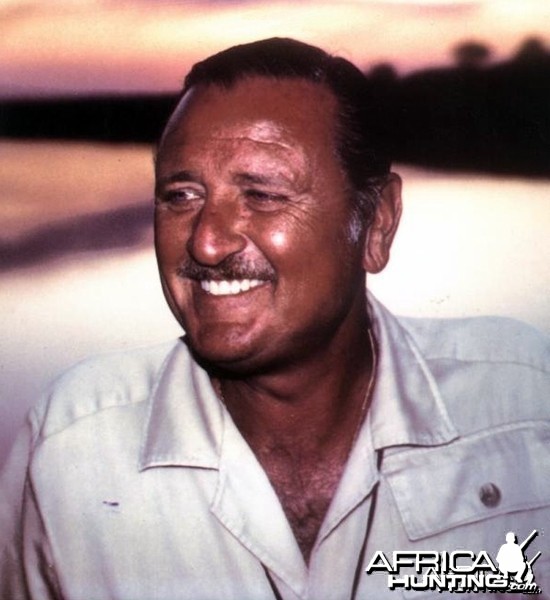
Peter Hathaway Capstick (1940-1996)
Capstick's name frequently comes up in the same breath as Hemingway's and Ruark's in discussions of influential African hunting authors. But like all good storytellers, some have questioned Capstick's use of "literary license" in embellishing his stories. Nonetheless, his abilities as a riveting storyteller and creative (if somewhat folksy and informal) prose stylist are beyond dispute.
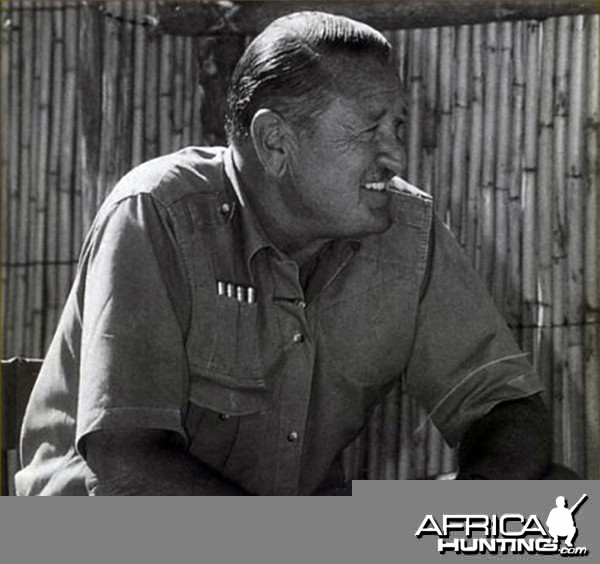
Peter Hathaway Capstick (1940-1996)
In early 1996 Capstick was a keynote speaker at the annual Safari Club International convention in Reno, Nevada when he collapsed in his hotel room and was diagnosed with exhaustion. He was immediately flown back to his adopted country of South Africa and underwent heart bypass surgery in a Pretoria hospital. He died just before midnight on March 13th due to complications from surgery.
After a small private ceremony, his ashes were scattered over the Chobe River in northeastern Botswana.
The .470 Capstick rifle cartridge, developed by A-Square's Colonel Arthur B. Alphin in 1990, bears his name. His legacy is also saluted by The Dallas Safari Club's annual Peter Hathaway Capstick Hunting Heritage Award for the promotion of responsible hunting and wildlife conservation.
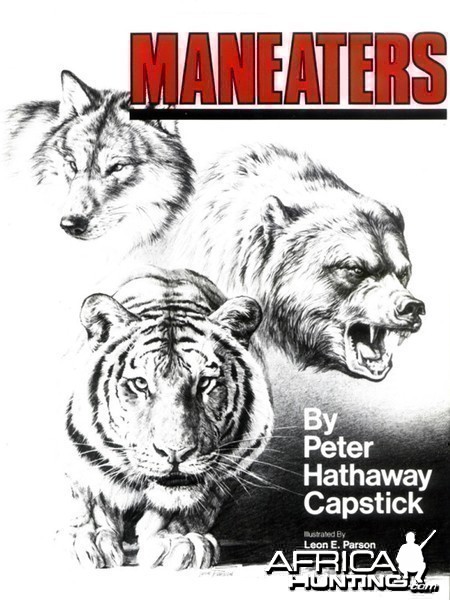
Maneaters by Peter H. Capstick. Veteran adventurer Capstick explores the wide world of man-eaters-creatures who regard Homo sapiens as just another noon-day snack. The ultimate horror of being eaten alive is very real, and in this book Capstick covers sharks, lions, leopards, tigers, bears, wolves, cannibals, and some other "marginal" killers such as jaguar and puma. Many people consider this to be one of Capstick's best.
His Books
• A Man Called Lion
• The African Adventurers: A Return To Silent Places
• Death in a Lonely Land
• Death in the Dark Continent
• Death in the Long Grass
• Death in the Silent Places
• The Last Ivory Hunter
• Last Horizons
• Maneaters
• Peter Capstick's Africa : A Return To The Long Grass
• Sands of Silence
• Safari: the Last Adventure
• Warrior: the Legend of Colonel Richard Meinertzhagen

Last Horizons, Hunting, Fishing & Shooting On Five Continents by Peter H. Capstick. Prior to his successful Death in the Tall Grass , Capstick contributed to sporting magazines such as Guns and Ammo , Outdoor Life and American Hunter. This volume, a collection of pieces written between 1969 and 1986, will be welcomed warmly by sportsmen and women, safari buffs and vicarious adventurers. In addition to his tales of stalking and shooting dangerous game, Capstick holds forth on guns and ammunition; he says many safari clients carry more guns than they can handle. He discusses hunting the smaller African game (antelope) and recounts fishing experiences in Central and South America. In the final chapter, Capstick turns to whimsya mythical Open Day on dragons. Even a rabid anti-hunter would find this piece entertaining.
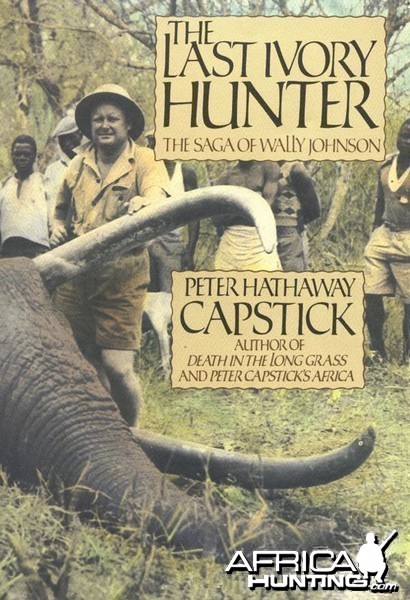
The Last Ivory Hunter by Peter H. Capstick. At a time when elephants were the scourge of the Mozambique countryside, trampling crops and killing villagers, and when lions mauled and killed dozens of people annually, good hunters were in great demand. Wally Johnson was one of the best; a professional ivory hunter, gold prospector and safari leader for more than half a century, he shot nearly 100 lions, 1300 elephants and perhaps 2000 buffalo. After the 1975 revolution in Mozambique, he was forced to flee. Not a conventional biography, this book is really a collaboration, a dialogue, between old friends with shared interests. Capstick, who has acquired a large audience with his books about hunting in Africa ( Death in the Long Grass and others), makes a few explanatory remarks at the beginning of each chapter, leading Johnson into reminiscence. He talks freely about his hazardous experiences in the bush (he survived the bite of the deadly gaboon viper and goring by a Cape buffalo); about safari clients (among them, Robert Ruark); and about the natives and their magic arts. Capstick and Johnson are splendid raconteurs, vividly recalling a vanished era.

Warrior, The Legend Of Colonel Richard Meinertzhagen by Peter H. Capstick. Meinertzhagen (1878-1967) was a fascinating enigma: soldier, ornithologist, spy, big-game hunter, friend of Lawrence of Arabia, gentile supporter of the Jewish state, and killer. Capstick bases much of his account on Meinertzhagen's diaries, adding his own years of experience in Africa to help him vividly portray this British colonial officer who served in India, the Middle East, and especially British East Africa before and during World War I (and donning a uniform to fight at age 70!). A former big-game hunter and guide who died in 1996, Capstick has written widely about African people and wildlife. Here he is deliberately anecdotal, adding his strong opinions in describing the "glorious adventures and cunning bravery" of a man he both admires and abhors as a pioneering influence in guerrilla warfare, military intelligence, and individual resistance to stupidity.
Filmography
• Capstick - Botswana Safari
• Capstick - Hunting the White Rhino
• Capstick - Hunting the African Elephant
• Capstick - Hunting the African Lion
• Capstick - Hunting the Cape Buffalo
• Capstick - Botswana Safari
• Capstick - Last Safari
Peter Hathaway Capstick (1940-1996)
Peter Hathaway Capstick was a famous American hunter and author. Born in New Jersey and educated at the University of Virginia, he walked away from a successful Wall Street career shortly before his thirtieth birthday to become a professional hunter first in Central and South America and later--and most famously--in Africa. Capstick spent much of his life in Africa, a land he called his "source of inspiration."Though he spent decades hunting some of the world's most dangerous game, his death did not come from a lion's jaws or an elephant's tusks. A chain-smoker and heavy drinker, he died at the relatively young age of 56 from complications following heart surgery.
Peter H. Capstick with the tusks of the famous elephant, Phelwana, which had to be destroyed in Kruger National Park after being injured through unknown causes. The tusks weigh 158 and 141 pounds respectively, making him the largest tusker ever recorded in the region.
After a short career as a Wall Street stockbroker, Capstick headed to Latin America. There he traveled widely while hunting, fishing, and mastering the Spanish language. After a few years he returned to New York, where he founded a business arranging professionally guided hunting trips. Shortly thereafter he took a position as hunting and fishing director of Winchester Adventures of New York, a subsidiary of the famous gun manufacturer. In that capacity he made his first trip to Africa in 1968 . Subsequently he began working as a professional hunter and game ranger in Zambia, Botswana, and Rhodesia.
Peter Hathaway Capstick (1940-1996)
Capstick started writing about his adventures in the late 1960s and soon published numerous articles in various sporting magazines. In 1977 he published his first book--Death in the Long Grass which became a major commercial success and established his reputation as a teller of hair-raising true adventure stories. He subsequently went on to become the world's best selling hunting author with a string of books detailing his own adventures as well as those of other well known hunters.
Peter Hathaway Capstick (1940-1996)
Capstick's name frequently comes up in the same breath as Hemingway's and Ruark's in discussions of influential African hunting authors. But like all good storytellers, some have questioned Capstick's use of "literary license" in embellishing his stories. Nonetheless, his abilities as a riveting storyteller and creative (if somewhat folksy and informal) prose stylist are beyond dispute.
Peter Hathaway Capstick (1940-1996)
In early 1996 Capstick was a keynote speaker at the annual Safari Club International convention in Reno, Nevada when he collapsed in his hotel room and was diagnosed with exhaustion. He was immediately flown back to his adopted country of South Africa and underwent heart bypass surgery in a Pretoria hospital. He died just before midnight on March 13th due to complications from surgery.
After a small private ceremony, his ashes were scattered over the Chobe River in northeastern Botswana.
The .470 Capstick rifle cartridge, developed by A-Square's Colonel Arthur B. Alphin in 1990, bears his name. His legacy is also saluted by The Dallas Safari Club's annual Peter Hathaway Capstick Hunting Heritage Award for the promotion of responsible hunting and wildlife conservation.
Maneaters by Peter H. Capstick. Veteran adventurer Capstick explores the wide world of man-eaters-creatures who regard Homo sapiens as just another noon-day snack. The ultimate horror of being eaten alive is very real, and in this book Capstick covers sharks, lions, leopards, tigers, bears, wolves, cannibals, and some other "marginal" killers such as jaguar and puma. Many people consider this to be one of Capstick's best.
His Books
• A Man Called Lion
• The African Adventurers: A Return To Silent Places
• Death in a Lonely Land
• Death in the Dark Continent
• Death in the Long Grass
• Death in the Silent Places
• The Last Ivory Hunter
• Last Horizons
• Maneaters
• Peter Capstick's Africa : A Return To The Long Grass
• Sands of Silence
• Safari: the Last Adventure
• Warrior: the Legend of Colonel Richard Meinertzhagen
Last Horizons, Hunting, Fishing & Shooting On Five Continents by Peter H. Capstick. Prior to his successful Death in the Tall Grass , Capstick contributed to sporting magazines such as Guns and Ammo , Outdoor Life and American Hunter. This volume, a collection of pieces written between 1969 and 1986, will be welcomed warmly by sportsmen and women, safari buffs and vicarious adventurers. In addition to his tales of stalking and shooting dangerous game, Capstick holds forth on guns and ammunition; he says many safari clients carry more guns than they can handle. He discusses hunting the smaller African game (antelope) and recounts fishing experiences in Central and South America. In the final chapter, Capstick turns to whimsya mythical Open Day on dragons. Even a rabid anti-hunter would find this piece entertaining.
The Last Ivory Hunter by Peter H. Capstick. At a time when elephants were the scourge of the Mozambique countryside, trampling crops and killing villagers, and when lions mauled and killed dozens of people annually, good hunters were in great demand. Wally Johnson was one of the best; a professional ivory hunter, gold prospector and safari leader for more than half a century, he shot nearly 100 lions, 1300 elephants and perhaps 2000 buffalo. After the 1975 revolution in Mozambique, he was forced to flee. Not a conventional biography, this book is really a collaboration, a dialogue, between old friends with shared interests. Capstick, who has acquired a large audience with his books about hunting in Africa ( Death in the Long Grass and others), makes a few explanatory remarks at the beginning of each chapter, leading Johnson into reminiscence. He talks freely about his hazardous experiences in the bush (he survived the bite of the deadly gaboon viper and goring by a Cape buffalo); about safari clients (among them, Robert Ruark); and about the natives and their magic arts. Capstick and Johnson are splendid raconteurs, vividly recalling a vanished era.
Warrior, The Legend Of Colonel Richard Meinertzhagen by Peter H. Capstick. Meinertzhagen (1878-1967) was a fascinating enigma: soldier, ornithologist, spy, big-game hunter, friend of Lawrence of Arabia, gentile supporter of the Jewish state, and killer. Capstick bases much of his account on Meinertzhagen's diaries, adding his own years of experience in Africa to help him vividly portray this British colonial officer who served in India, the Middle East, and especially British East Africa before and during World War I (and donning a uniform to fight at age 70!). A former big-game hunter and guide who died in 1996, Capstick has written widely about African people and wildlife. Here he is deliberately anecdotal, adding his strong opinions in describing the "glorious adventures and cunning bravery" of a man he both admires and abhors as a pioneering influence in guerrilla warfare, military intelligence, and individual resistance to stupidity.
Filmography
• Capstick - Botswana Safari
• Capstick - Hunting the White Rhino
• Capstick - Hunting the African Elephant
• Capstick - Hunting the African Lion
• Capstick - Hunting the Cape Buffalo
• Capstick - Botswana Safari
• Capstick - Last Safari
Last edited by a moderator: